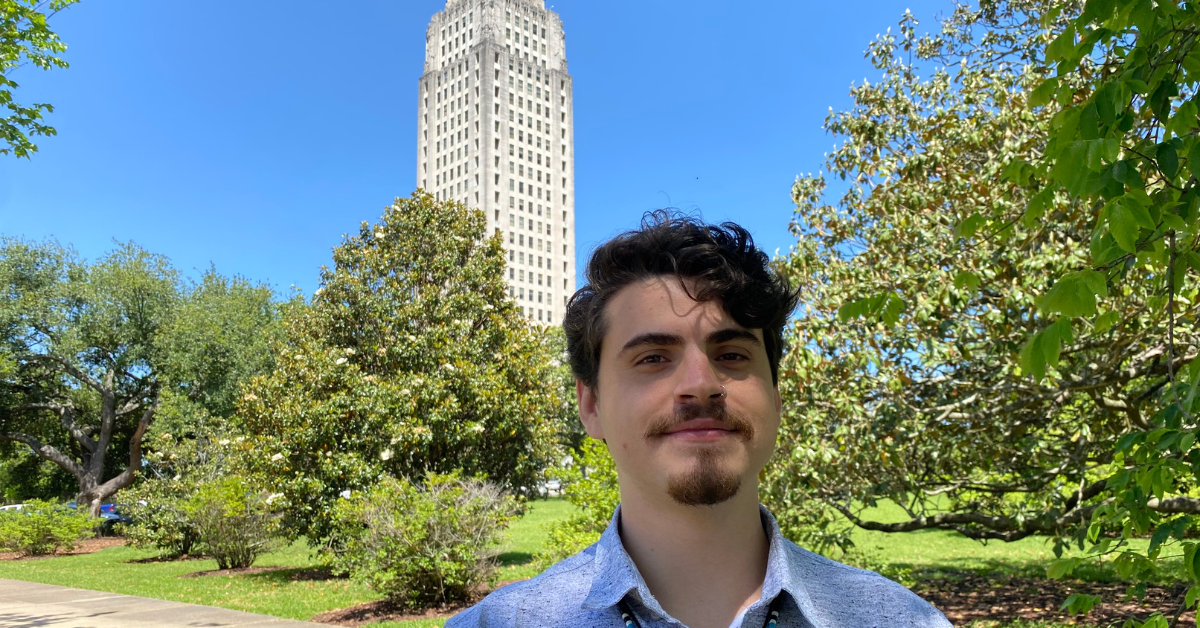
Apr 17, 2023 4:00:00 PM
by Lami Zhang
Chief Devon Parfait’s earliest memories revolve around the Louisiana bayous of Terrebonne Parish, where his people, the Grand Caillou/Dulac Band of Biloxi-Chitimacha-Choctaw, have lived for nearly 200 years.
There, he learned to fish, crab, and shrimp with his grandfather, who raised worms for bait. His grandfather also grew figs. “We got to eat from the land, eat from the water,” he says. Those memories would later spark his interest in environmental justice.
But in 2005, Chief Devon’s life on the land and water of his ancestors was upended by Hurricane Rita. Though Hurricane Katrina, which hit just a month earlier, lives on in the popular imagination, Rita was the more powerful storm. It caused $18.5 billion dollars of property damage. The back-to-back disasters forced 1.4 million people to leave the state.
Like hundreds of thousands of other families, Devon’s family lost their home. “The storm surge stayed for a long time, and mold and mildew grew in the house,” he says. “We would have had to tear it down and start brand new.”
Instead, the family moved north, staying with relatives, first north of Lake Pontchartrain and later in Marrero, a suburb of New Orleans. The disruption took a toll on both his learning and his friendships.
“I feel like it was hard to build any kind of academic background, just because I’d never had any kind of consistency in learning,” he says. “I hear other people talking about their friends and how they had friends from elementary school or middle school, and they’ve been able to maintain this connection all their life and live in this one place. And I never really had that.”
Despite being displaced, he stayed close to his family and visited Dulac often, spending time with his cousin, then-Chief Shirell Parfait-Dardar, a strong advocate for federal recognition of their tribe and of environmental preservation. “Her connection to this land has really guided me throughout my life,” he says.
After a particularly long and intense conversation when he was 12, he asked, “How can I help? What can I do?” That was the moment when Parfait-Dardar knew her cousin was called to become the next chief.
A few years later, while attending community college, Williams College geoscience professor Rónadh Cox invited future-Chief Devon and his brother to a conference on land loss and environmental justice. After her presentation, Cox invited Devon to speak. His remarks were well received, and the experience inspired him to push himself academically in order to transfer to Williams.
The journey began with his experience at Williams-Mystic, a coastal and ocean studies program operated jointly by Williams College and Connecticut’s Mystic Seaport Museum.
“That 10-day voyage changed my life,” he says. Being out on the water inspired him to begin research on coastal erosion; his first project examined its effects on Connecticut’s Barn Island Marsh and the Mystic Estuary.
Later, while she was on sabbatical, Cox invited Devon to house-sit for her and audit classes at Williams, including his first class in geographic information systems. He and another student from Louisiana worked together to map coastal erosion in their home state.
“That led to all the stuff we did through my four years, developing better methodology and including more communities to look at those disproportionate rates and get some actual numbers,” he says.
His undergraduate research determined that his tribe’s territory is losing land at more than double the rate of coastal Louisiana overall.
Now, the recent Williams graduate and newly-installed chief has joined the staff of the Environmental Defense Fund, where he’s working on community-supported solutions. A key effort already in progress involves backfilling canals dug, then abandoned, by oil and gas industries.
When most of these canals were dug, the earth brought up by dredging was tossed up each side, creating “spoil banks.” It’s a relatively simple process to push that earth back into the canal, refilling it. Doing so keeps saltwater storm surges out of wetland ecosystems, slowing land loss, preserving shellfish habitat and protecting communities from storms.
“There are about 27,000 canals across Louisiana, and you could fill them all for the cost of one F-22 fighter plane,” Chief Devon says.
That’s $143 million, which sounds like a lot, but it’s less than one thousandth of the total 2022 Air Force budget.
Editor’s Note: Join the fight for environmental justice. Help Chief Devon and the Indigenous people of Louisiana stabilize their communities and save their land. Click to donate to the First People’s Conservation Council’s disaster recovery and coastal restoration fund.
Lami Zhang is an editorial intern at Brightbeam. She is currently a fourth year undergraduate student at Northwestern University studying Journalism and Political Science.
The story you tell yourself about your own math ability tends to become true. This isn’t some Oprah aphorism about attracting what you want from the universe. Well, I guess it kind of is, but...
If you have a child with disabilities, you’re not alone: According to the latest data, over 7 million American schoolchildren — 14% of all students ages 3-21 — are classified as eligible for special...
The fight for educational equity has never been just about schools. The real North Star for this work is providing opportunities for each child to thrive into adulthood. This means that our advocacy...
Your donations support the voices who challenge decision makers to provide the learning opportunities all children need to thrive.
Ed Post is the flagship website platform of brightbeam, a 501(c3) network of education activists and influencers demanding a better education and a brighter future for every child.
© 2020–2024 brightbeam. All rights reserved.
Leave a Comment